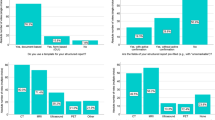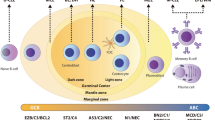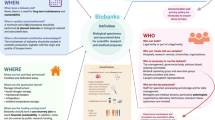Abstract
The amount of information produced by genomic sequencing is vast, technically complicated, and can be difficult to interpret. Appropriately tailoring genomic information for non-geneticists is an essential next step in the clinical use of genomic sequencing. To initiate development of a framework for genomic results communication, we conducted eighteen qualitative interviews with oncologists who had referred adult cancer patients to a matched tumor-normal tissue genomic sequencing study. In our qualitative analysis, we found varied levels of clinician knowledge relating to sequencing technology, the scope of the tumor genomic sequencing study, and incidental germline findings. Clinicians expressed a perceived need for more genetics education. Additionally, they had a variety of suggestions for improving results reports and possible resources to aid in results interpretation. Most clinicians felt genetic counselors were needed when incidental germline findings were identified. Our research suggests that more consistent genetics education is imperative in ensuring the proper utilization of genomic sequencing in cancer care. Clinician suggestions for results interpretation resources and results report modifications could be used to improve communication. Clinicians’ perceived need to involve genetic counselors when incidental germline findings were found suggests genetic specialists could play a critical role in ensuring patients receive appropriate follow-up.

Similar content being viewed by others
References
American Society of Clinical Oncology. (2013). New Cigna Policy on Cancer Genetic Testing Poses Risks to High Quality Cancer Care | ASCO. http://www.asco.org/advocacy-policy/asco-in-action/new-cigna-policy-cancer-genetic-testing-poses-risks-high-quality. Accessed 16 April 2017.
Armstrong, J., Toscano, M., Kotchko, N., Friedman, S., Schwartz, M. D., Virgo, K. S., et al. (2015). Utilization and outcomes of BRCA genetic testing and counseling in a National Commercially Insured Population. JAMA Oncology, 1(9), 1251. doi:10.1001/jamaoncol.2015.3048.
Behrendt, C. E., Hurria, A., Tumyan, L., Niland, J. C., & Mortimer, J. E. (2014). Socioeconomic and clinical factors are key to uncovering disparity in accrual onto therapeutic trials for breast cancer. Journal of the National Comprehensive Cancer Network : JNCCN, 12(11), 1579–1585. http://www.ncbi.nlm.nih.gov/pubmed/25361805 Accessed 16 April 2017.
Bell, R. A., McDermott, H., Fancher, T. L., Green, M. J., Day, F. C., & Wilkes, M. S. (2015). Impact of a randomized controlled educational trial to improve physician practice behaviors around screening for inherited breast cancer. Journal of General Internal Medicine, 30(3), 334–341. doi:10.1007/s11606-014-3113-5.
Bombard, Y., Bach, P. B., & Offit, K. (2013a). Translating genomics in cancer care. Journal of the National Comprehensive Cancer Network : JNCCN, 11(11), 1343–1353. http://www.ncbi.nlm.nih.gov/pubmed/24225968 Accessed 16 April 2017.
Bombard, Y., Robson, M., & Offit, K. (2013b). Revealing the incidentalome when targeting the tumor genome. JAMA, 310(8), 795–796. doi:10.1001/jama.2013.276573.
Buchanan, A., Datta, S. K., Skinner, C. S., Hollowell, G. P., Beresford, H. F., Freeland, T., et al. (2015). Randomized trial of Telegenetics vs. in-person cancer genetic counseling: Cost, Patient Satisfaction and Attendance. Journal of Genetic Counseling, 24(6), 961–970. doi:10.1007/s10897-015-9836-6.
Buchanan, A., Rahm, A. K., & Williams, J. L. (2016). Alternate service delivery models in cancer genetic counseling: A mini-review. Frontiers in Oncology, 6, 120. doi:10.3389/fonc.2016.00120.
Cigna. (2017). Genetic Testing and Counseling Program. https://www.cigna.com/healthcare-professionals/resources-for-health-care-professionals/genetic-testing-and-counseling-program. Accessed 16 April 2017.
Clauser, S. B., Johnson, M. R., O’Brien, D. M., Beveridge, J. M., Fennell, M. L., & Kaluzny, A. D. (2009). Improving clinical research and cancer care delivery in community settings: Evaluating the NCI community cancer centers program. Implementation Science, 4(1), 63. doi:10.1186/1748-5908-4-63.
Copur, M. S., Ramaekers, R., Gönen, M., Gulzow, M., Hadenfeldt, R., Fuller, C., et al. (2016). ReCAP: Impact of the National Cancer Institute Community cancer centers program on clinical trial and related activities at a community cancer Center in Rural Nebraska. Journal of Oncology Practice, 12(1), 67–68. doi:10.1200/JOP.2015.005736.
Cox, S. L., Zlot, A. I., Silvey, K., Elliott, D., Horn, T., Johnson, A., & Leman, R. F. (2012). Patterns of cancer genetic testing: A randomized survey of Oregon clinicians. Journal of Cancer Epidemiology, 2012, 1–11. doi:10.1155/2012/294730.
Cragun, D., Camperlengo, L., Robinson, E., Caldwell, M., Kim, J., Phelan, C., et al. (2015). Differences in BRCA counseling and testing practices based on ordering provider type. Genetics in Medicine, 17(1), 51–57. doi:10.1038/gim.2014.75.
Delikurt, T., Williamson, G. R., Anastasiadou, V., & Skirton, H. (2015). A systematic review of factors that act as barriers to patient referral to genetic services. European Journal of Human Genetics, 23(6), 739–745. doi:10.1038/ejhg.2014.180.
Dorschner, M. O., Amendola, L. M., Shirts, B. H., Kiedrowski, L., Salama, J., Gordon, A. S., et al. (2014). Refining the structure and content of clinical genomic reports. American Journal of Medical Genetics Part C: Seminars in Medical Genetics, 166(1), 85–92. doi:10.1002/ajmg.c.31395.
Downs, J. S., de Bruin, W. B., & Fischhoff, B. (2008). Parents’ vaccination comprehension and decisions. Vaccine, 26(12), 1595–1607. doi:10.1016/j.vaccine.2008.01.011.
Everett, J. N., Gustafson, S. L., & Raymond, V. M. (2014). Traditional roles in a non-traditional setting: Genetic counseling in precision oncology. Journal of Genetic Counseling, 23(4), 655–660. doi:10.1007/s10897-014-9698-3.
Freedman, A. N., Wideroff, L., Olson, L., Davis, W., Klabunde, C., Srinath, K. P., et al. (2003). US physicians’ attitudes toward genetic testing for cancer susceptibility. American Journal of Medical Genetics, 120A(1), 63–71. doi:10.1002/ajmg.a.10192.
Frey, M. K., Biewald, M. A., Worley, M. J., Taylor, J. S., Lin, S. N., & Holcomb, K. (2012). Lynch syndrome: Awareness among medical students at a United States medical school. Current women’s health reviews, 8(3), 242–247. doi:10.2174/157340412803760667.
Garraway, L. A. (2013). Genomics-driven oncology: Framework for an emerging paradigm. Journal of clinical oncology : official journal of the American Society of Clinical Oncology, 31(15), 1806–1814. doi:10.1200/JCO.2012.46.8934.
Goedde, L. N., Stupiansky, N. W., Lah, M., Quaid, K. A., & Cohen, S. (2017). Cancer genetic counselors’ current practices and attitudes related to the use of tumor profiling. Journal of genetic counseling. doi:10.1007/s10897-017-0065-z.
Goss, E., Lopez, A. M., Brown, C. L., Wollins, D. S., Brawley, O. W., & Raghavan, D. (2009). American Society of Clinical Oncology policy statement: Disparities in cancer care. Journal of Clinical Oncology, 27(17), 2881–2885. doi:10.1200/JCO.2008.21.1680.
Gray, S. W., Hicks-Courant, K., Cronin, A., Rollins, B. J., & Weeks, J. C. (2014). Physicians’ attitudes about multiplex tumor genomic testing. Journal of Clinical Oncology, 32(13), 1317–1323. doi:10.1200/JCO.2013.52.4298.
Green, E. D., Guyer, M. S., Green, E. D., Guyer, M. S., Manolio, T. A., & Peterson, J. L. (2011). Charting a course for genomic medicine from base pairs to bedside. Nature, 470(7333), 204–213. doi:10.1038/nature09764.
Gunderson, C. C., Rowland, M. R., Wright, D. L., Andrade, K. L., Mannel, R. S., McMeekin, D. S., & Moore, K. N. (2016). Initiation of a formalized precision medicine program in gynecologic oncology. Gynecologic Oncology, 141(1), 24–28. doi:10.1016/j.ygyno.2016.02.024.
Haga, S., Burke, W., Ginsburg, G., Mills, R., & Agans, R. (2012). Primary care physicians’ knowledge of and experience with pharmacogenetic testing. Clinical Genetics, 82(4), 388–394. doi:10.1111/j.1399-0004.2012.01908.x.
Hamilton, A. B., Oishi, S., Yano, E. M., Gammage, C. E., Marshall, N. J., & Scheuner, M. T. (2014). Factors influencing organizational adoption and implementation of clinical genetic services. Genetics in Medicine, 16(3), 238–245. doi:10.1038/gim.2013.101.
Hirsch, B. R., Locke, S. C., & Abernethy, A. P. (2016). Experience of the National Cancer Institute Community cancer centers program on community-based cancer clinical trials activity. Journal of Oncology Practice, 12(4), e350–e358. doi:10.1200/JOP.2015.005090.
Houwink, E. J. F., Henneman, L., Westerneng, M., van Luijk, S. J., Cornel, M. C., Dinant, J. G., & van der Vleuten, C. (2012). Prioritization of future genetics education for general practitioners: A Delphi study. Genetics in Medicine, 14(3), 323–329. doi:10.1038/gim.2011.15.
Khoury, M. J., Coates, R. J., Fennell, M. L., Glasgow, R. E., Scheuner, M. T., Schully, S. D., et al. (2012). Multilevel research and the challenges of implementing genomic medicine. JNCI Monographs, 2012(44), 112–120. doi:10.1093/jncimonographs/lgs003.
Klitzman, R., Chung, W., Marder, K., Shanmugham, A., Chin, L. J., Stark, M., et al. (2013). Attitudes and practices among internists concerning genetic testing. Journal of Genetic Counseling, 22(1), 90–100. doi:10.1007/s10897-012-9504-z.
Koil, C. E., Everett, J. N., Hoechstetter, L., Ricer, R. E., & Huelsman, K. M. (2003). Differences in physician referral practices and attitudes regarding hereditary breast cancer by clinical practice location. Genetics in medicine : official journal of the American College of Medical Genetics, 5(5), 364–369. doi:10.1097/01.GIM.0000086477.00766.C9.
Larsson, J., & Holmström, I. (2007). Phenomenographic or phenomenological analysis: Does it matter? Examples from a study on anaesthesiologists’ work. International Journal of Qualitative Studies on Health and Well-being, 2(1), 55–64. doi:10.1080/17482620601068105.
Le Tourneau, C., Kamal, M., Trédan, O., Delord, J.-P., Campone, M., Goncalves, A., et al. (2012). Designs and challenges for personalized medicine studies in oncology: Focus on the SHIVA trial. Targeted Oncology, 7(4), 253–265. doi:10.1007/s11523-012-0237-6.
McGowan, M. L., Ponsaran, R. S., Silverman, P., Harris, L. N., & Marshall, P. A. (2016). “A rising tide lifts all boats”: establishing a multidisciplinary genomic tumor board for breast cancer patients with advanced disease. BMC medical genomics, 9(1), 71. doi:10.1186/s12920-016-0234-1.
Meric-Bernstam, F., Farhangfar, C., Mendelsohn, J., & Mills, G. B. (2013). Building a personalized medicine infrastructure at a major cancer center. Journal of Clinical Oncology, 31(15), 1849–1857. doi:10.1200/JCO.2012.45.3043.
Mody, R. J., Wu, Y.-M., Lonigro, R. J., Cao, X., Roychowdhury, S., Vats, P., et al. (2015). Integrative clinical sequencing in the management of refractory or relapsed cancer in youth. JAMA - Journal of the American Medical Association, 314(9), 913–925. doi:10.1001/jama.2015.10080.
Morgan, M. G. (Millett G. (2002). Risk communication : A mental models approach. Cambridge University Press.
National Cancer Institute. (2016). Blue Ribbon Panel Report-BRP-Cancer Moonshot - National Cancer Institute. https://www.cancer.gov/research/key-initiatives/moonshot-cancer-initiative/blue-ribbon-panel. Accessed 16 April 2017.
Pan, V., Yashar, B. M., Pothast, R., & Wicklund, C. (2016). Expanding the genetic counseling workforce: Program directors’ views on increasing the size of genetic counseling graduate programs. Genetics in Medicine, 18(8), 842–849. doi:10.1038/gim.2015.179.
Raymond, V. M., Gray, S. W., Roychowdhury, S., Joffe, S., Chinnaiyan, A. M., Parsons, D. W., & Plon, S. E. (2016). Germline findings in tumor-only sequencing: Points to consider for clinicians and laboratories: Table 1. Journal of the National Cancer Institute, 108(4), djv351. doi:10.1093/jnci/djv351.
Robinson, D. R., Wu, Y.-M., Vats, P., Su, F., Lonigro, R. J., Cao, X., et al. (2013). Activating ESR1 mutations in hormone-resistant metastatic breast cancer. Nature Genetics, 45(12), 1446–1451. doi:10.1038/ng.2823.
Robson, M. E., Bradbury, A. R., Arun, B., Domchek, S. M., Ford, J. M., Hampel, H. L., et al. (2015). American Society of Clinical Oncology policy statement Update: Genetic and Genomic Testing for Cancer Susceptibility. Journal of Clinical Oncology. doi:10.1200/JCO.2015.63.0996.
Roychowdhury, S., Iyer, M. K., Robinson, D. R., Lonigro, R. J., Wu, Y.-M., Cao, X., et al. (2011). Personalized oncology through integrative high-throughput sequencing: A pilot study. Science translational medicine, 3(111), 111ra121. doi:10.1126/scitranslmed.3003161.
Sateren, W. B., Trimble, E. L., Abrams, J., Brawley, O., Breen, N., Ford, L., et al. (2002). How Sociodemographics, presence of oncology specialists, and hospital cancer programs affect accrual to cancer treatment trials. Journal of Clinical Oncology, 20(8), 2109–2117. doi:10.1200/JCO.2002.08.056.
Scheuner, M. T., Sieverding, P., & Shekelle, P. G. (2008). Delivery of genomic medicine for common chronic adult diseases. JAMA, 299(11), 1320. doi:10.1001/jama.299.11.1320.
Schwaederle, M., Parker, B. A., Schwab, R. B., Fanta, P. T., Boles, S. G., Daniels, G. A., et al. (2014). Molecular tumor board: The University of California san Diego Moores Cancer Center experience. The Oncologist, 19(6), 631–636. doi:10.1634/theoncologist.2013-0405.
The White House. (2015). FACT SHEET: President Obama’s Precision Medicine Initiative | whitehouse.gov. https://obamawhitehouse.archives.gov/the-press-office/2015/01/30/fact-sheet-president-obama-s-precision-medicine-initiative. Accessed 16 April 2017.
Van Allen, E. M., Wagle, N., & Levy, M. A. (2013). Clinical analysis and interpretation of cancer genome data. Journal of clinical oncology : official journal of the American Society of Clinical Oncology, 31(15), 1825–1833. doi:10.1200/JCO.2013.48.7215.
Zikmund-Fisher, B. J., Turkelson, A., Franzblau, A., Diebol, J. K., Allerton, L. A., & Parker, E. A. (2013). The effect of misunderstanding the chemical properties of environmental contaminants on exposure beliefs: A case involving dioxins. The Science of the Total Environment, 447, 293–300. doi:10.1016/j.scitotenv.2013.01.030.
Author information
Authors and Affiliations
Corresponding author
Ethics declarations
Funding
Michigan Association of Genetic Counselors www.magcinc.org. University of Michigan Rackham Graduate Student Research Grant www.rackham.umich.edu. KR, JNE, JSR, RD, BJZ, AC and VMR are supported by NIH Clinical Sequencing Exploratory Research (CSER) Award NIH 1UM1HG006508.
Disclosures:
Victoria M. Raymond is currently an employee at Trovagene, Inc. This work was completed prior to establishment of this relationship.
Arul M. Chinnaiyan: Stock in Oncofusion Therapeutics, Armune Bioscience; Consulting/Advisory role: Oncofusion Therapeutics, Tempus, Armune; Patent/IP with University of Michigan.
Conflict of Interest
Caroline M. Weipert, Kerry A. Ryan, Jessica N. Everett, Beverly M. Yashar, Arul M. Chinnaiyan, J. Scott Roberts, Raymond De Vries, Brian J. Zikmund-Fisher, and Victoria M. Raymond declare no conflict of interest.
Human Studies and Informed Consent
All procedures performed in studies involved human participants were in accordance with the ethical standards of the responsible committee on human experimentation (institutional and national) and with the Helsinki Declaration of 1975, as revised in 2000. This study was deemed exempt from federal regulations by the University of Michigan’s Institutional Review Board.
Animal Studies
No animal studies were carried out by the authors for this article.
Rights and permissions
About this article
Cite this article
Weipert, C.M., Ryan, K.A., Everett, J.N. et al. Physician Experiences and Understanding of Genomic Sequencing in Oncology. J Genet Counsel 27, 187–196 (2018). https://doi.org/10.1007/s10897-017-0134-3
Received:
Accepted:
Published:
Issue Date:
DOI: https://doi.org/10.1007/s10897-017-0134-3




